For Those Who Wish to Gamble Online
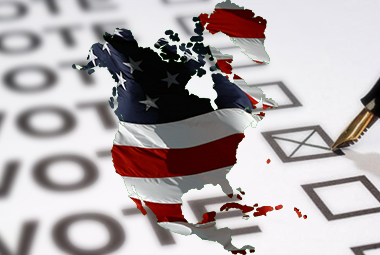
There are many important issues that one should take into consideration when it comes to choosing the next President of the United States. For one thing, people often consider where the individual stands on social issues, or perhaps economic/trade issues are of the utmost importance to a particular person. Other people still might be concerned about immigration, while others yet find themselves most concerned with education and some others healthcare.
Regardless of where your priorities lie, one matter that is not frequently addressed when it comes to voting for a U.S. President, or really, when it comes to voting in most Federal Government level elections, is where a candidate stands on online gambling.
The one thing that I do understand is that many WoV Members find themselves trepidatious about the prospect of playing online. In addition to the potential for rigged or pirated software to be offered by a particular online casino, there also exists the possibility of being slow-paid or no-paid when one does win against the software that may or may not be rigged. However, it is for exactly that reason that everyone should be concerned about the stance that each Presidential candidate takes with respect to the possibility of expressly legalizing and regulating online gambling.
Think about it: Were online gambling to become expressly legalized and regulated, especially at the federal level, the ultimate result would be not only that American citizens would be patently enabled to have more options as to what they would like to do with their own money, but furthermore, the casinos could be perceived, as a whole, to be, ‘Safer,’ to play at. For one thing, the regulations would likely call for more rigorous testing and verification of software, and it can also be assumed that delayed payments, or no payments at all, as well as the use of ridiculous justifications for not paying players would be a thing of the past for casinos authorized by the United States Government.
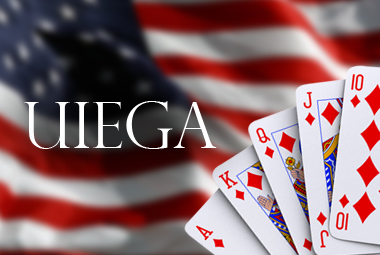
Of course, one can also advance the argument that the positions of the Presidential candidates are largely irrelevant as online gambling, and most legislative decisions involving gambling, in general, seem to be left up to the states. For example, New Jersey (and a few others) already have online gambling that is both legalized and regulated as a function of those individual states. Secondly, the Tenth Amendment provides that the Federal Government only possesses those powers specifically granted to it by the Constitution of the United States of America, and gambling does not seem to be mentioned anywhere in the Constitution.
It is entirely for that reason that states are allowed to enact their own laws with respect to gambling, and we see that happen all the time. Hawaii, for example, is one state in which no form of gambling whatsoever is legal, and Utah shares that sort of legislation. In fact, Utah is the one state to specifically go out of its way to amend its laws to prohibit online gambling directly.
Different states have other gambling options, as well, states can either choose to have legalized and regulated commercial casinos, or alternatively, not to do that. Individual states may choose to either have a lottery or not have one with Nevada, perhaps ironically, to be one of the few states that does not have a state lottery. States may also enact legislation that either regulates charitable gambling, or alternatively, expressly makes charitable gambling illegal. ‘Friendly,’ home games are even specifically prohibited in a few states.
The bottom line is that the Federal Government has rarely stepped in and enacted any sort of legislation that would tread on the rights of the states to do what they wish with respect to gambling. One exception to that rule, however, is the ratification of the Unlawful Internet Gambling Enforcement Act. (UIGEA)
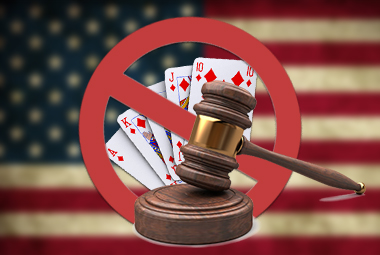
The UIGEA is nothing more than an add-on to the SAFE Port Act and has been described as, “Hastily tacked onto the end of unrelated legislation,” therefore, politicians who voted in favor of the SAFE Port Act also voted in favor of the UIGEA, even though they probably didn’t have the opportunity to read it. The UIGEA is also paramount in the assertion that many people subscribe to that online gambling is patently illegal for any U.S. citizen, but nothing could be further from the truth.
In fact, the UIGEA largely does not even apply to players as it merely prohibits gambling businesses from accepting payments from individuals who are using the Internet to gamble in contravention of either state or federal law. In many cases, gambling online does not violate any state laws whatsoever, even in those states that do not have expressly legalized and regulated online gambling, and in other cases, the state laws are ambiguous as to whether or not online gambling is allowed.
In fact, the only states in which it can reasonably be argued that such transactions are illegal from the side of the gambling company are those states in which online gambling has either been expressly made illegal, or alternatively, states that make it clear, in no uncertain terms, that either all forms of gambling or any form of gambling that is not specifically legalized by the state in question is illegal.
Even then, that does not make it illegal for the players to effectuate the financial transaction resulting in a deposit to an online casino, and furthermore, payment processing companies have been explicitly cleared of any wrongdoing, as well. In other words, the law only makes it a crime for a gambling company to directly receive monies for the purpose of unlawful Internet gambling, and most of those companies, if not all of them, are headquartered outside of the United States to begin with.
The ultimate result is that a sitting President would have very little power in enacting any laws as pertains to online gambling, and the federal government, at my best guess, would be highly unlikely to specifically illegalize the act of Internet gambling completely, or alternatively, to specifically legalize and regulate it at the federal level.
Even if the Federal Government were in any way inclined to take action with respect to Internet gambling, such action would first fall under the purview of The Senate and the U.S. House of Representatives rather than directly to the President. After all, it is the duty of the Legislative Branch (Senate, House) to make the laws while the duty of the Executive Branch (President) is to enforce them. The most involvement that a President would likely have in this regard is that his/her Vice-President could theoretically become the tie-breaking vote in the United States Senate, as the VP does have that duty in the event of a tie. Furthermore, the President could theoretically veto any legislation that appears on his/her desk related to online gambling, or alternatively, sign the piece of legislation.
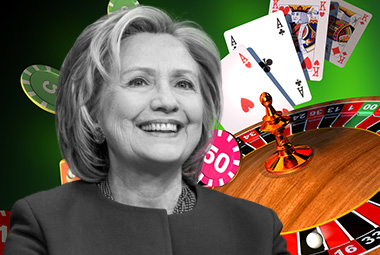
However, there are certain situations under which the President’s power of veto might come into play. For example, there may be legislation designed to eliminate the UIGEA which would enable all online gambling companies, particularly relevant to those overseas, to openly and directly do business with anyone in the United States that they like. Most state laws that either directly or indirectly prohibit online gambling provide punishments for the operators rather than mere players, with very few exceptions. In other words, some operators might choose to offer their games to individuals in a state that directly prohibits online gambling, but there (usually) isn’t all that much that the state can actually do to them.
In other states, the risk of gambling online (from a legality standpoint) is on both the player and the operator, however, if there have been any cases of actual prosecution of someone for the mere act of online gambling, I’d be most interested in hearing about them. Even in those states in which online gambling is patently illegal, as a practical matter, the law is basically never enforced against mere players.
The United States Government striking the UIGEA would save the casinos a ton of money and that savings could theoretically be passed to the players in the form of better games and/or better promotions. Online casinos who do not wish to run afoul of the U.S. Government, for one reason or another, do have to pay these payment processors some percentage of the deposit which ultimately cuts into their profits.
When we look at the previous stances of the current two major party candidates with respect to online gambling, one might assume that Trump is the more gambling-friendly of the two given the fact that he once owned multiple casinos in Atlantic City, New Jersey. At one time, he owned the Trump Taj Mahal (about to be closed), the Trump Plaza (closed) and the Trump Marina, which has since become The Golden Nugget. When Trump was not too busy filing bankruptcy on one property or the other, he was likely advocating casinos forcefully.
Trump, further, once indicated to Forbes magazine that legalized and regulated online gambling would have to happen because the United States is missing out.
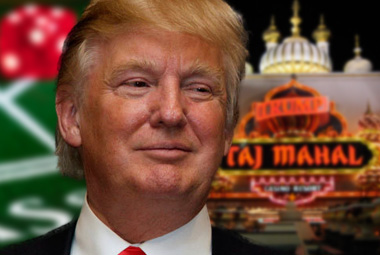
Not only is the United States missing out, but many individual states are missing out, as well. Online gambling is the ultimate form of convenience gambling, one can roll out of bed and, without even first bothering to shower or brush his/her teeth, be on the Internet playing a craps game, even a live one!
Both state and federal governments would benefit from players choosing to do exactly that. State governments, in all likelihood, would be the entities that regulate the online casinos that operate within that state. As a result, those very same state governments would collect a percentage of the revenues of the online casinos in the form of taxes, as well as having licensing and other fees that may apply to the casinos.
Both levels of government would benefit from the fact that it would be incumbent on the online casino companies to report their income to them for the purpose of taxation. At least, that’s true in the case of online gambling companies that are also based in the state in question. With respect to the federal government, however, that would always be true.
Finally, player tracking online is actually even more sophisticated and accurate than that in land-based casinos. In fact, with most sites, virtually every bet that a player ever makes is logged, so were online gambling expressly legalized and regulated, players could essentially be sent a win/loss report at the beginning of every year for the previous year that would also be reported to both levels of government, and the players would have to incorporate same into their tax filings accordingly.
The result is a win-win for the state and federal governments, though some players might understandably be frustrated by the tax implications. However, as the law stands now, a player already has to report all gambling winnings at the end of every year regardless of whether or not they were obtained at a licensed and regulated online casino. The federal government, of course, has different win thresholds for different game types that make it mandatory for both the casino and the player to report the win via a W2-G form, but with online casino play, it could be par for the course as relates year end results.
Furthermore, having additional online casinos based in the United States would be a boon to employment, however small. These casinos would be highly likely to hire United States based people for customer service positions as well as software designers and other tech gurus for their other operations. The online casinos that have live casinos, much as we see in New Jersey, might also hire their dealers from within the country rather than use an overseas feed, in fact, state laws could actually mandate that the physical game be taking place within the state.
Getting back to Trump, while his history might indicate a general friendliness towards Internet gambling, he has been endorsed by billionaire casino mogul Sheldon Adelson who has also promised significant donations to the Trump campaign. The only political issue that Adelson really seems to care about is the state of Internet gambling, so it might be assumed that any pro Internet gambling that might hit Trump’s desk, if he wins the presidency, would be met with a swift veto. In the meantime, any anti Internet gambling legislation, at least whatever legislation could be enacted without treading on states’ rights, would probably be signed by Trump.
Interestingly enough, while it would seem from his past that Trump would support Internet casinos, but recent events have told a different story, the same could be said for Clinton.
For one thing, it is somewhat widely known that Hillary Clinton voted in favor of the SAFE Port Act, which again, had the UIGEA tacked on to it. It is both arguably and probably true that then New York Senator Clinton was not fully aware of the implications of the rushed on UIGEA and, quite possibly, actually had no idea what the add-on actually was.
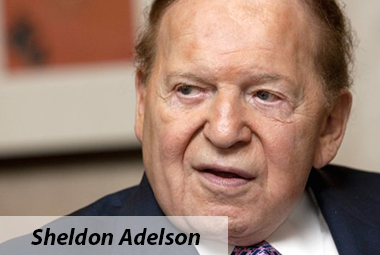
Other than that, Hillary Clinton’s primary concern with Internet gambling seems to be in the realm of consumer safety, and that should come as no surprise and would also be the primary goal of having it regulated by the states. Hillary Clinton supported a proposal for a study proposed by Nevada Legislator Shelley Berkley which would focus on how to regulate Internet gambling to make it both safe and fair, and moreover, how the United States might be able to compete for players in the international market.
Furthermore, Hillary Clinton was interviewed recently by Nevada Public Radio station KNPR:
http://knpr.org/knpr/2016-02/hillary-clinton-internet-gambling-federal-land-and-legalized-pot
With respect to online gambling, Hillary Clinton did not have anything negative to say about it, she merely stated that it is something that should be looked at and, if Internet gambling were to spread, such an event would require regulation to ensure that consumers are adequately protected. In other words, while she may not have come directly out and said, “I’m in favor of it,” her comments pointed towards her being in favor of it provided the proper regulatory framework was in place.
Simply put, while I realize that there are some addicted people out there as well as some people who may not have experienced Internet gambling yet that will become addicted, on the whole, I think it would be a good idea to expressly legalize and regulate Internet gambling. From my perspective, the federal government as well as most states could always use a little extra tax revenue, and Internet gambling seems like it would be a reliable source of just that.
Of course, despite the fact that I write for multiple gambling websites, Internet Gambling is not the end all and be all of who I would or wouldn’t vote for, but as it turns out, I’m probably not going to vote for either of the two major party candidates, anyway. However, if you are going to vote for one of the two major party candidates and Internet gambling regulation in the United States is your primary concern, then I would go with the candidate who was NOT endorsed by a man whose primary purpose in life for the last several years has seemed to be stopping the spread of Internet gambling.
Conclusion
While the express legalization and regulation of Internet gambling in as many states as possible is something that I consider a prudent and economically advantageous decision for both the state and federal governments, that issue is far from being one of my chief concerns in this election. However, continuing to follow these candidates and garner as much information as possible about their stance on online gambling will certainly benefit you if the regulation and expansion of online gambling in the United States is either chief amongst your concerns, or alternatively, if it is not but you are otherwise split between the two major party candidates.

Despite the past of the two candidates with Donald Trump being a former casino owner and Hillary Clinton having voted yes on the SAFE Port Act, an act which merely had the UIGEA as a tack on; the somewhat recent endorsement of Donald Trump by Sheldon Adelson combined with Hillary Clinton’s public statements with respect to online gambling make it very clear that Hillary is the better candidate of the two to vote for if that is your primary concern or could otherwise be a, ‘Tie-breaker,’ issue.
While I do not know if regulated online casinos will be good for players as a whole, (the promotions might not be as good, and there may be more stringent requirements with respect to mandatory tax reporting) there can be little to no doubt that Internet casinos that have been specifically legalized and regulated by either the federal government or government of an individual state will enjoy a better public perception and will further appeal to potential players who do not have any interest in online casinos at this time. Furthermore, the regulation and expansion of such casinos could help with employment, in a small way, as well as giving the United States the ability to compete with other overseas online casinos for business.
Finally, even in the Presidential race, I cannot help but reiterate that the President has little to no actual power when it comes to decisions that would impact online casinos. The worst case scenario is that a president could either sign or veto a bill that might overturn the UIGEA, make the terms of the UIGEA even more stringent, or otherwise impact the ability of states to offer Internet casinos. Once again, the choice is pretty obvious if you want to know who to elect for those of you for whom this is a hot button issue.
Either way, make sure, if you’re an American citizen, to get out and vote!



